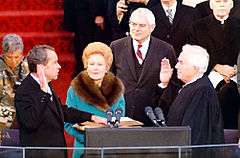Second inauguration of Richard Nixon
The second inauguration of Richard Nixon as President of the United States was held on Saturday, January 20, 1973, at the East Portico of the United States Capitol in Washington, D.C. This was the 47th inauguration and marked the commencement of the second and final four-year term of both Richard Nixon as President and Spiro Agnew as Vice President. This made Nixon the first and, as of 2020, only person to be inaugurated four times as both president and vice president. Chief Justice Warren E. Burger administered the oath of office of both the President and Vice President.[1] During the ceremony, Look With Pride On Our Flag, a song dedicated to President Nixon and composed by Hank Fort, was played.[2]
 | |
| Date | January 20, 1973 |
|---|---|
| Location | United States Capitol, Washington, D.C. |
| Organized by | Joint Congressional Committee on Inaugural Ceremonies |
| Participants | Richard Milhous Nixon 37th President of the United States — Assuming office Warren Earl Burger Chief Justice of the United States — Administering oath Spiro Theodore Agnew 39th Vice President of the United States — Assuming office Warren Earl Burger Chief Justice of the United States — Administering oath |
Inaugural festivities
Inaugural festivities in the evening were at Kennedy Center Concert Hall. Classical music conducted by Eugene Ormandy from Philadelphia Orchestra. The program included Beethoven’s Fifth Symphony and Copland’s Fanfare for the Common Man and Tchaikovsky’s 1812 Overture. [3]
Death of Lyndon B. Johnson
Just 4 weeks after the death of former president Harry S. Truman, former president Lyndon B. Johnson, whom Nixon replaced in the White House since January 1969, died of a heart attack at the age of 64, two days after Nixon's second inauguration. Johnson thus became the sixth president who died during his immediate successor's administration, following George Washington (1799), James K. Polk (1849), Andrew Johnson (1875), Chester A. Arthur (1886) and Calvin Coolidge (1933), who died during the administrations of John Adams, Zachary Taylor, Ulysses S. Grant, Grover Cleveland (1st term), and Herbert Hoover, respectively. Many of the ceremonies that the Armed Forces Inauguration Committee had planned during the ten days had to be canceled to allow for a full state funeral.[4]
Many of the military men who participated in the inauguration took part in the funeral.[4] Johnson's casket traveled the entire length of the Capitol, entering through the Senate wing when taken into the rotunda to lie in state, and exiting through the House wing; this was due to construction on the East Front steps.[5]
See also
References
- "The 47th Presidential Inauguration: Richard M. Nixon, January 20, 1973". United States Senate. Retrieved April 8, 2020.
- "Eleanor H. Fort, Composer, Dead". The Daily Times. Salisbury, Maryland. January 14, 1973. p. 48. Retrieved December 25, 2015 – via Newspapers.com.

- "A Tale of Two Concerts". The American Scholar. 2017-01-19. Retrieved 2019-08-12.
- Elsen, William A. (January 25, 1973). "Ceremonial Group Had Busy 5 Weeks". The Washington Post. p. D3.
- Foley, Thomas (January 25, 1973). "Thousands in Washington Brave Cold to Say Goodbye to Johnson". The Los Angeles Times. p. A1.
External links
| Wikisource has original text related to this article: |
